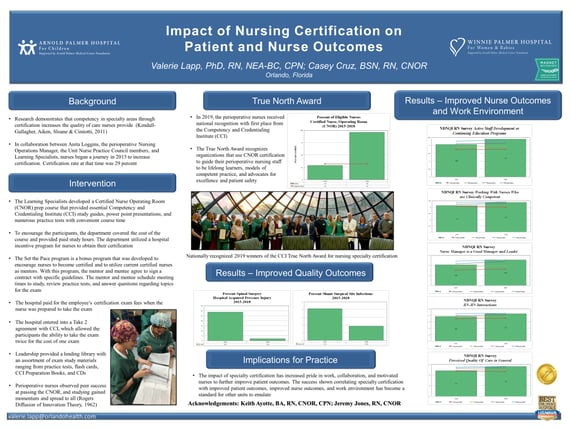
In 2019, CCI was honored to present Orlando Health Arnold Palmer Hospital for Children with the TrueNorth Award. CCI’s TrueNorth Award recognizes facilities that use certification as a compass to guide their perioperative nurses towards being lifelong learners, models of competent practice, and advocates for excellence and patient safety.
Dr. Valerie Lapp, Ph.D., RN, NEA-BC, CPN, and Casey Cruz, BSN, RN, CNOR, of Orlando Health Arnold Palmer Hospital for Children, created a poster presentation titled Impact of Nursing Certification on Patient and Nurse Outcomes. We had the opportunity to discuss the poster with Dr. Valerie Lapp.
Q. What is the general synopsis of your findings?
This performance improvement initiative examined several variables related to the effect of the specialty of Certified Operating Room Nurse (CNOR) on the quality outcomes of shunt surgical site infections (SSI), and operating room acquired pressure injuries (PI) over a three year period. Nursing engagement and work environment outcomes reported through national benchmarking with the NDNQI® RN Survey (Job Satisfaction Scales and the Professional Environment Scales) were also compared during this time frame. As specialty certification increased, shunt SSI and PI significantly decreased while the nurse engagement and work environment outcomes increased from between the 25th and 50th percentile ranking to between the 75th and 90th percentile ranking when compared nationally to like Magnet® peer groups. With hospitals wishing to attain Magnet® designation, specialty certification, positive patient outcomes, and nurse perception of their work environment weigh heavily in attaining that goal.
Q. Can you go into greater detail regarding the result charts?
Following the interventions, specialty certification (CNOR) increased over the three years from 29% to 96%. Pressure injuries sustained during lengthy prone spinal surgery in pediatric patients decreased from a rate of 28.6 to 2.06%, while shunt SSIs rates fell from 4.21 to 1.85%.
The following results depict the increase in the NDNQI® RN Survey scores over the three years that nursing specialty certification increased. These core traits are essential for nurse satisfaction. The increase in scores of Active Staff Development or Continuing Education Programs from 3.06 to 3.4 (on a four-point scale) demonstrated nurses’ perception of the availability of resources to advance their profession. Working with Nurses who are Clinically Competent increased from 3.12 to 3.37 (on a four-point scale) reflected the increase in their knowledge and skills obtained to pass CNOR. Given that the nurse manager facilitated study times and space to support the nurses’ advancement in their profession is reflected in Nurse Manager is a Good Manager and Leader with scores increasing from 3.06 to 3.55 (on a four-point scale). Possibly enriched by nurses working alongside and mentoring each other, positive RN to RN Interactions increased from 4.84 to 5.25 (on a six-point scale). And finally, the Perceived QOC in General score increased from 3.41 to 3.8 (on a four-point scale). Prior studies have found a significant relationship between the attainment of certification and nurses’ perception of their skills.
Q. Which intervention program was the most attractive to nurses?
The most attractive intervention programs consisted of the combination of the Take 2 agreement with CCI, which allowed the participants the ability to take the exam twice for the cost of applying for the certification once, and the offering of a review class by the institution.
Q. How do you think your findings can help other facilities?
The success shown correlating specialty certification with improved patient outcomes and improved nurse and work environment outcomes has become a standard for other units at Arnold Palmer Hospital for Children to emulate. Additionally, leadership in sister hospital operating rooms offering similar incentives have seen increases in their CNOR rates with better patient and nurse outcomes. Therefore, one could deduce that these findings may be transferable to other facilities.
Q. After attaining the TrueNorth Award, were nurses in your facility more motivated to pursue and promote certification?
Attainment of the TrueNorth Award further motivated nurses to elevate their standards to become a certified OR nurse. Positive peer pressure from those certified has encouraged those not certified in wanting to become a part of the group. The professional culture on the unit has changed, and it is now the expectation to attain certification.
Dr. Valerie Lapp and Casey Cruz’s poster presentation has made it clear that encouraging certification increases workplace outcomes, nursing engagement, and patient safety. Additionally, receiving CCI’s TrueNorth Award further motivates nurses to elevate their standards by becoming a certified perioperative nurse and encourages facilities to create a culture of certification by setting the expectation to attain certification.

